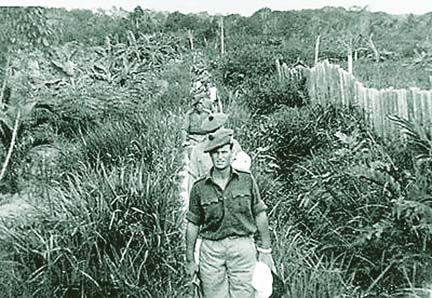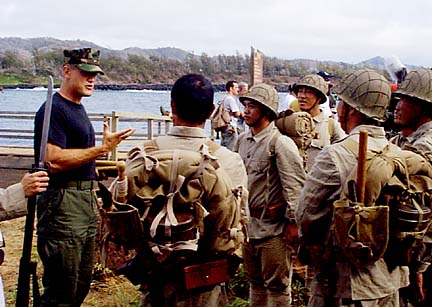Advertisement - Click to support our sponsors.


On location:
Kauai
'To End All Wars' steps out
Director returns home By Anthony Sommer
from the shadow of 'Pearl Harbor'
Kauai correspondentLIHUE -- "Are those three decapitated heads out here?" director David Cunningham's voice crackles over the radio from out on the end of the pier.
"No, they're back in the prop truck," replies property man Gabriel Higgings who immediately trots off in that direction.
Surreal stuff, this moviemaking ...
Pretty soon the three disembodied heads, one still wearing a British Army helmet and all suitably grotesque, appear on pilings along the dock at Ahukini Landing where "To End All Wars" started shooting May 8.
The camera rolls as four blindfolded British and American officers (all professional actors) are pushed by Japanese soldiers (all Kauai extras) through a crowd of Malaysian villagers (more Kauai extras) down the dock, past the three heads (all from a Hollywood prop room), and loaded on an army truck (rented on Kauai) waiting to take them to a POW camp.

They cover the 100 yards from the start to the end of the sequence in just under 12 hours, consuming huge quantities of both film and the special effects powder burned to create the clouds of thick black smoke billowing across the dock, which is supposed to be in Sumatra.While "Pearl Harbor" was grabbing all the publicity (it's hard to top crunching a Japanese dive bomber on Ford Island), Cunningham and a few carpenters were on Kauai quietly building a full-scale prisoner of war camp in a jungle valley near the defunct Koloa Sugar Mill. His project has received zero public attention The film does have a web site, www.toendallwars.com, but the cast isn't even listed.
It is, as they say in show biz, "low budget." At the same time, it is very "high energy." Cunningham and his close-knit crew, many of whom have worked with him in the past, are pushing hard from dawn to dusk six days a week and will be until late June.
"To End All Wars" is a true story, based on former POW Ernest Gordon's 1962 book, "Through the Valley of the Kwai." Neither a sequel nor a prequel to the famous film "The Bridge on the River Kwai," the two are nonetheless related.
Both take place in 1942 after the British surrender of Singapore and involve two of many groups of Allied prisoners of war forced to build "The Railway of Death" through the Thai and Burmese jungles to supply Japanese troops in their planned invasion of India. Nearly 16,000 POWs and 80,000 native laborers died building the railway, which never was completed.
Gordon was a captain in the Argyll and Sutherland Highlanders, one of many regiments that surrendered at Singapore. The story begins right after he and three friends who attempted to escape the Japanese in a boat are captured and sent to Thailand (then Siam). Gordon nearly dies of disease but is saved by a fellow prisoner.

In the course of the story, Gordon makes his own peace with the Japanese and the major theme of the movie involves forgiving extremely brutal captors . A reunion filmed in February between the real Gordon, who after the war became a minister and was for 26 years Dean of the Chapel at Princeton University, and a former Japanese officer at the camp, will be at the end of the movie.Except for Kiefer Sutherland, who portrays an American officer, all of the key players are Scottish actors. The most familiar to American audiences will be Robert Carlyle, charismatic star of "The Full Monty."
Gordon is played by a relative newcomer, Ciarán McMenamin. It's hard to not like McMenamin. Asked whether he wanted to check out a photo taken for this story --the actors all have "kill rights" in their contracts, meaning they can forbid the use of any still photo taken on the set if they think it's unflattering -- his response was: "Hey, I look like what I look like." Not every actor would say that.
And then there are the 3,000 extras in the movie who never speak a word of dialogue and whose names never will appear in the credits, all Kauai extras hired to play British and Dutch and American POWs, Japanese soldiers and Malaysian villagers. Some will work for only one day, others the full two months. Everybody gets $75 for a 12-hour day and free breakfast and lunch.
Domingo Laranio, dressed as a Malaysian peasant, has been an extra in several Kauai-based film projects and was a set carpenter on "The Hawaiians" 30 years ago. In real life he's a retired tour bus driver.
"Did you see 'Flight of the Intruder' on TV the other night?" he asks. "I was in that. I watch all of them when they're on TV."

Sixty years ago, Laranio loaded 100-pound sacks of sugar on the same Ahukini Landing where he portrays an elderly Malaysian. Now in ruins, Ahukini once was the major sugar dock on Kauai.The reason so many extras are needed is not because of many large crowd scenes. A recognizable extra like Laranio, who is photographed in a port Sumatra, can't logically also show up again on the Kwai River.
"I can't have the same faces over and over," said Kauai casting director Angela Tillson. Tillson conducted auditions all over the island -- "K-Mart, twice, Salt Pond Park, my house, the street, the malls, the stores" -- and wasn't bashful about accosting people who never even considered extra work, if they had the right "look." She found an amazing number of skinny Caucasian men to play emaciated POWs.
With shooting underway, Tillson is both Den Mother and First Sergeant for groups of hundreds of extras that change every day. One minute she is in the mess tent shouting, "If you guys don't sign my sheet I'll think you're irresponsible and I'll never call you back," and the next she is saying to an extra with an ill-fitting costume, "Come with me, I can get you something better than that."
Tillson tossed five extras off the film the first day for smoking dope. By the middle of the week, those becoming regulars on the set are bringing her little gifts. She has an astonishing ability to remember names.
"To End All Wars" is only the second feature film Cunningham has directed. The first, "Beyond Paradise," was a coming-of-age film about a Caucasian high school student in a predominantly local high school on the Big Island, where Cunningham grew up.
Cunningham's track record -- and it's lengthy for a 28-year-old -- is in filming documentaries and that's how he's shooting "To End All Wars."
The story is being shot chronologically, very unusual for a movie. On the third day, makeup artists are told to take some of the dirt OFF the British prisoners because they look far too grungy for that early in the story.
And it's being shot with a single, hand-held camera using available light, just like a documentary. There won't be any sound stage interior shots; everything is being done on Kauai, outdoors.
Filming is scheduled to run through June with a Christmas opening planned. Whether or not it does well at the box office on the mainland, it will be standing room only on Kauai. Everyone on the island is either in the movie or knows 10 people who are.
Director keeps promise
By Tim Ryan
to return home
Star-BulletinIT'S hard not to admire independent filmmakers, those men and women who struggle for production financing because they're driven to tell character-driven tales devoid of expensive explosions.
But when a filmmaker also keeps long-held promises to return home to make movies and to use interns to help create a talent base for crew and actors, then you have to believe he has as much substance as the stories he chooses to tell.
So it is with David Cunningham, 29, producer and director of "To End All Wars," now in its third of seven weeks of filming on Kauai. In 1997, Cunningham, raised in Kona since age four, debuted his film "Beyond Paradise" -- a coming of age story set in Hawaii -- at the Hawaii International Film Festival.
"To End All Wars" was brought to Cunningham by his now partner Jack Hafer. Cunningham read the book during a month-long location scout in South Africa.
"The story blew me away," Cunningham said. "And I had the feeling in my gut that the timing for this project was crucial, just right."
Since he agreed to do the film, author Gordon has been honored by England's Queen, the division depicted in the film has been honored in Scotland, and the Japanese soldier who reconciled with Gordon has been honored by the princess of Thailand for his peace mission.
But Cunningham had some requirements: filming had to begin right away, it had to remain independent to protect the story, and it had to be done in Hawaii.
David Lean's film "Bridge on the River Kwai," though beautifully done, "rewrote history and cheapened what these men went through," Cunningham said.
"Whenever people refer back to what happened on the railway of death, they picture guys whistling while they work," he said. "Nothing has gone for the jugular or expressed the message that ends with reconciliation."
The film is "even-handed about how the prisoners transcended their environment through selfless acts and reached out beyond themselves to find something that turned out to be far greater than this tortured atrocity," Cunningham said.
Cunningham describes the story as "a great backdrop to deal with issues of the heart: conflict of tension between people who are driven to rule your life, while you try to save your home."
The filmmaker's criteria for producing a film remains the same: it must have the potential to emotionally stir the viewer.
His most recent documentary, "The Dream Center" starring Edward James Olmos, was about a Los Angeles shelter that pulls homeless kids and teen-age prostitutes from the street to help them. He's also produced a film about mercy ships, which sail around the world bringing food and clothing to needy countries.
Cunningham has visited more than 130 countries and every continent on earth, accompanying his parents who worked with the International University. He entered film school at 18; the next year he was filming his first production.
Though people tried to talk him out of filming in Hawaii because of the expense, Cunningham, who has many friends who've left to find jobs elsewhere, is committed to building the local film industry.
On this production he has a dozen film students from the Big Island, offered local crews first choice to work in key positions, and is using 20 local actors for speaking roles.
"I want to give something back to my home," he said.
When filming wraps here late next month Cunningham and his hapai wife will travel to Kona to await the birth of their first child.
"I want the baby to be a kamaaina," he said. "Then we can get those cheap hotel rates."
Click for online
calendars and events.